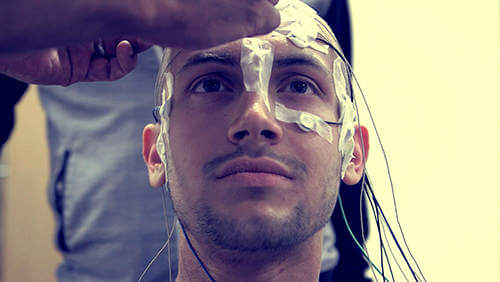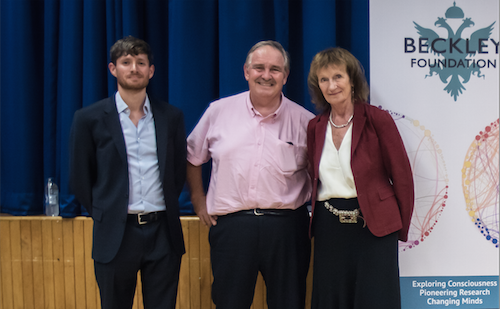
World’s First Image of The Brain On LSD To Be Crowdfunded by Professor Nutt and Amanda Feilding

Together with Professor David Nutt, former advisor to the UK government, Amanda Feilding and the Beckley Foundation are turning to the new science crowdfunding site Walacea.com to raise money for a ground-breaking study producing the very first images of the human brain on LSD.
Carried out as part of the Beckley Foundation Psychedelic Research Programme by the same team who created the most downloaded scientific report in Imperial’s history on the effect of psilocybin (magic mushrooms) on the brain, this new study uses both fMRI and MEG imaging to produce hugely detailed images of the effects of LSD in the brain, which will begin to clarify the mechanisms of action underpinning the compound’s transformational potential.
In the simplest terms the fMRI captures snapshots of activity taking place in the brain. MEG works more like a video, showing how brain processes are affected by LSD.
Despite the promising studies that were carried out on LSD in the 1960s, which demonstrated the enormous potential of LSD to further our understanding of consciousness and create potential new medical interventions for conditions such as depression, addiction and chronic pain, this is the first ever brain imaging study to investigate the human brain on LSD.
Amanda Feilding said: ‘After decades of damaging legal and bureaucratic obstacles, we are finally unveiling the brain mechanisms underlying the potential of LSD, not only to heal many debilitating illnesses but also to deepen our understanding of consciousness itself’.
Why This Study Is Being Crowdfunded
Professor Nutt said: ‘Despite the incredible potential of this drug to further our understanding of the brain, political stigma has silenced research. We must not play politics with promising science that has so much potential for good’.
The censorship of psychedelics caused by the ‘War on Drugs’ has obstructed scientific research over the last 40 years by making research councils cautious about funding research in this field and scientists hesitant about getting involved. However, many scientists and members of the public feel that this censorship must end. ‘Only with the very best scientific research will we overcome the taboo and reintegrate these valuable therapeutic substances into the fabric of society’ says Amanda Feilding.
This study involved giving 20 subjects a dose of LSD and using the latest imaging technology to capture the effect. The crowdfunding campaign on Walacea.com is looking to raise £25,000 and will run for 45 days from 5 March 2015.
The previous research that was carried out by Prof Nutt, Dr Carhart-Harris and Amanda Feilding on psilocybin discovered that the compound decreases the blood supply, particularly to the Default Mode Network (DMN), a network in the brain that acts like the conductor in an orchestra, coordinating and censoring the different areas in the brain involved in conscious awareness. They predict that LSD will behave in a similar way to psilocybin but the answers will not be clear until the data analysis is completed.
We believe that researching psychedelics has huge potential to open up the floodgates to new medical interventions that can help those suffering from physical and mental health disorders.
Selected Media Coverage of the Campaign:
- Psychedelic drugs like LSD could be used to treat depression, study suggests– The Guardian
- Psychedelic Science Should Not Be Feared, It Should Be Encouraged – The Huffington Post
- This is your brain on LSD? Scientists want to find out – CBS News
- LSD Researchers are crowdfunding the first images of the brain on acid – Vice- Motherboard
Podcast
- All
Links
- All
Support
- All
BIPRP
- All
Science Talk
- All
Amanda's Talks
- All
- Video Talk
- Featured
- 2016 Onwards
- 2011-2015
- 2010 and Earlier
- Science Talk
- Policy Talk
One-pager
- All
Music
- All
Amanda Feilding
- All
Events
- All
Highlights
- All
Psilocybin for Depression
- All
Current
- All
Category
- All
- Science
- Policy
- Culture
Substance/Method
- All
- Opiates
- Novel Psychoactive Substances
- Meditation
- Trepanation
- LSD
- Psilocybin
- Cannabis/cannabinoids
- Ayahuasca/DMT
- Coca/Cocaine
- MDMA
Collaboration
- All
- Beckley/Brazil Research Programme
- Beckley/Maastricht Research Programme
- Exeter University
- ICEERS
- Beckley/Sant Pau Research Programme
- University College London
- New York University
- Cardiff University
- Madrid Computense University
- Ethnobotanicals Research Programme
- Freiburg University
- Medical Office for Psychiatry and Psychotherapy, Solothurn
- Beckley/Sechenov Institute Research programme
- Hannover Medical School
- Beckley/Imperial Research Programme
- King's College London
- Johns Hopkins University
Clinical Application
- All
- Depression
- Addictions
- Anxiety
- Psychosis
- PTSD
- Cancer
- Cluster Headaches
Policy Focus
- All
- Policy Reports
- Advisory Work
- Seminar Series
- Advocacy/Campaigns
Type of publication
- All
- Original research
- Report
- Review
- Opinion/Correspondence
- Book
- Book chapter
- Conference abstract
- Petition/campaign
Search type
